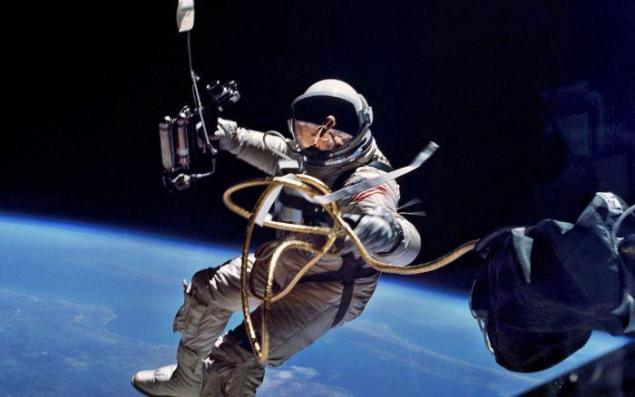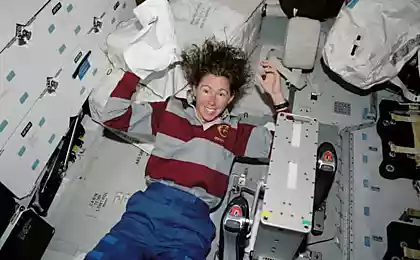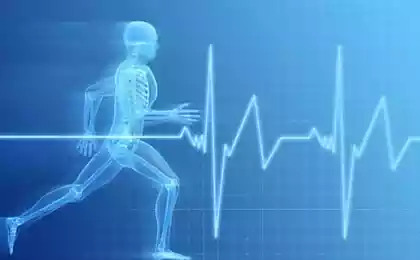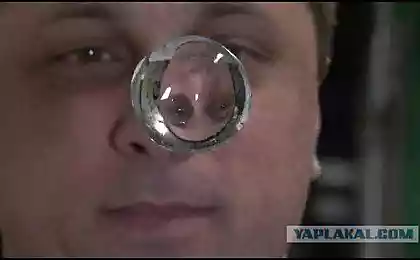1036
What awaits human in space
1. During the first 10-15 seconds you remain awake and feel like the tongue moisture evaporates.
The same happens with the entire surface of the body - as in heavy perspiration.
Therefore, in a vacuum person feels icy cold.

2. There may be nausea and vomiting, as gases from the stomach and intestines rapidly pushed out.
(Note: before the spacewalk from soda and hot sauces is better to abstain).
3. If the eustachian tubes in the ears plugged with earwax, or something else,
there may be problems with the inner ear, if not - okay.
4. The heart rate increases sharply and then gradually falls, as well as blood pressure.
Venous pressure is growing steadily as the education in the body of the gas bubbles.
5. The body can swell up to the size, twice the normal, the skin is stretched,
of course, if you do not wear tight elastic suit.
6. According to the "Collection of data on space biology»,
accurately fitted elastic garment can completely prevent the formation of gas bubbles
while reducing the pressure to 15 Torr (mm Hg).
For comparison, normal atmospheric pressure - 760 Torr, and the pressure on the moon - about 10-11 torr.
Blood boils at 47 Torr. The body is inflated due to the fact that the fluid in the soft tissues passes into the gaseous state.
However, the skin is strong enough to withstand this pressure.
So, you do not tear apart, you just razduetes like a balloon.
7. As soon as the body pushes steam through the nose and mouth, and the content of fluid in the body decreases,
you feel all the more cold. Mouth and tongue become icy.
8. If you find yourself with all this and more in direct sunlight (no special protective equipment),
you get severe sunburn.
9. Due to lack of oxygen the skin becomes bluish-purple hue, known as cyanosis.
10. The brain and heart remain in relative order of about 90 seconds.
When the blood pressure falls to 47 Torr, the blood begins to boil and gradually stops the heart.
After that, you have nothing to help.
11. But if the pressure is restored in time, the body gradually back to normal.
However, for a while you lose eyesight and ability to move. But over time, both functions are restored.
In addition, a few days you will not feel the taste of food.
12. On the other hand, if you hold your breath or try to interfere with the free
exit air during sudden decompression otherwise,
that "increased intrapulmonary pressure will lead to so strong expansion
the thorax, which may cause ruptures in the lung capillaries and destruction.
Withholding the air squeezed out of the lungs in the chest, and through the damaged blood vessels penetrate
directly into the bloodstream. And through the bloodstream, air bubbles already spread throughout the body
and can easily reach such vital organs as the heart and brain. "
Something similar may occur during decompression on board the aircraft flying at high altitude.
If that happens - remember, hold your breath in any case impossible.
The same happens with the entire surface of the body - as in heavy perspiration.
Therefore, in a vacuum person feels icy cold.

2. There may be nausea and vomiting, as gases from the stomach and intestines rapidly pushed out.
(Note: before the spacewalk from soda and hot sauces is better to abstain).
3. If the eustachian tubes in the ears plugged with earwax, or something else,
there may be problems with the inner ear, if not - okay.
4. The heart rate increases sharply and then gradually falls, as well as blood pressure.
Venous pressure is growing steadily as the education in the body of the gas bubbles.
5. The body can swell up to the size, twice the normal, the skin is stretched,
of course, if you do not wear tight elastic suit.
6. According to the "Collection of data on space biology»,
accurately fitted elastic garment can completely prevent the formation of gas bubbles
while reducing the pressure to 15 Torr (mm Hg).
For comparison, normal atmospheric pressure - 760 Torr, and the pressure on the moon - about 10-11 torr.
Blood boils at 47 Torr. The body is inflated due to the fact that the fluid in the soft tissues passes into the gaseous state.
However, the skin is strong enough to withstand this pressure.
So, you do not tear apart, you just razduetes like a balloon.
7. As soon as the body pushes steam through the nose and mouth, and the content of fluid in the body decreases,
you feel all the more cold. Mouth and tongue become icy.
8. If you find yourself with all this and more in direct sunlight (no special protective equipment),
you get severe sunburn.
9. Due to lack of oxygen the skin becomes bluish-purple hue, known as cyanosis.
10. The brain and heart remain in relative order of about 90 seconds.
When the blood pressure falls to 47 Torr, the blood begins to boil and gradually stops the heart.
After that, you have nothing to help.
11. But if the pressure is restored in time, the body gradually back to normal.
However, for a while you lose eyesight and ability to move. But over time, both functions are restored.
In addition, a few days you will not feel the taste of food.
12. On the other hand, if you hold your breath or try to interfere with the free
exit air during sudden decompression otherwise,
that "increased intrapulmonary pressure will lead to so strong expansion
the thorax, which may cause ruptures in the lung capillaries and destruction.
Withholding the air squeezed out of the lungs in the chest, and through the damaged blood vessels penetrate
directly into the bloodstream. And through the bloodstream, air bubbles already spread throughout the body
and can easily reach such vital organs as the heart and brain. "
Something similar may occur during decompression on board the aircraft flying at high altitude.
If that happens - remember, hold your breath in any case impossible.
























